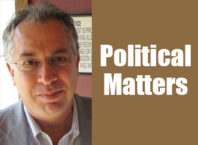By Mordecai Specktor
Larry Leventhal, a wonderful human being and a dedicated legal advocate for American Indians, was remembered in words and in song at his funeral, Jan. 20th at Temple Israel in Minneapolis.
Larry Long sang the “Ballad of Larry Leventhal,” which included this verse: “Traveled the country over like a troubadour / The legal briefs he’d written scattered across the floor / Yet, he knew exactly where to find all that he wrote / The truth burned in his soul and he never gave up hope.”
Leventhal, who died Jan. 17 from pancreatic cancer at the age of 75, also was remembered by his brother-in-law, Bob Maisel, who spoke on behalf of the family. Maisel mentioned that Leventhal’s Hebrew name was Baruch (which means “blessed”), and his American Indian name was translated as “He Whose Voice Is Carried in the Wind”.
Clyde Bellecourt, a founder of the American Indian Movement (AIM), told mourners in the packed sanctuary that Leventhal was a “great warrior” for Indian people. Bellecourt said that the Jewish lawyer from St. Louis Park was involved in the incorporation of nearly every American Indian school, health clinic and housing project in the Twin Cities over recent decades.
During a recent phone conversation with Bellecourt, I asked him what he meant by the words “great warrior.”
“He was a lawyer in the battle for justice, a warrior,” replied Bellecourt. “Indian Country recognized him that way for all the work that he did for Indian people… I think he was a great warrior. He battled for justice, treaty rights, water and land issues, fishing and hunting, Indian religious freedom… culturally-based education, survival schools.”
The moving funeral service at Temple Israel concluded with three Ojibwe men playing hand drums and singing a traditional traveling-on song, as Leventhal’s casket was carried out of the sanctuary.
Leventhal was the treaty law expert on the legal team that represented Dennis Banks and Russell Means in the 1974 Wounded Knee leadership trial in St. Paul federal court. Leventhal was the last surviving member of the legal team that included William Kunstler, Mark Lane, Ken Tilsen and Doug Hall.
The U.S. government indicted hundreds of Indians after the 1973 occupation and paramilitary siege of Wounded Knee, on the Pine Ridge reservation. Judge Fred Nichol, who presided at the trial, did not want to hear Leventhal’s arguments related to the 1868 Fort Laramie Treaty between the United States and the Great Sioux Nation; however, as the trial wound on, he began to listen to the treaty rights arguments, according to Bellecourt. Nichol, who tried to rein in the flamboyant defense lawyers, eventually turned his wrath on the government prosecutors. The judge finally dismissed all charges against Banks and Means, and decried the government’s “sordid and misleading conduct” in the case.
Randy Furst wrote in the Star Tribune that the late lawyer and author Vine Deloria, Jr. once said of Leventhal: “He disarms so many opponents…. He comes across as a bumpkin. Then all of a sudden, you’re on the canvas, asking, ‘Who was that masked man?’”
Leventhal was one of the top five lawyers in the country on Indian treaty issues, according to Deloria, and “the only one who is white.”
At the shiva (a traditional Jewish remembrance gathering) the evening after the funeral, officials of the Lac Courte Oreilles Tribe, including the current chairman, Mic Isham, remembered some of the good work Leventhal did for the tribe, including helping to establish WOJB, the FM radio station located on the LCO reservation.
Also at the shiva, Mary Al Balber (Red Cliff Ojibwe) read an email she sent to members of the Minnesota American Indian Bar Association (MAIBA). Leventhal was a “Special Member” of MAIBA, and Balber said he “advised LCO in what later became the Voigt decision, which reaffirmed our treaty rights. The Tribble brothers, LCO members who challenged the treaty rights by fishing and getting arrested, were students in Larry’s federal Indian law class taught at St. Scholastica. Talk about having a professor who made a difference!”
I will always be grateful for Larry’s dedicated work on behalf of my son, Max, who was ensnared in the state government’s prosecution of local organizers after the 2008 Republican National Convention in St. Paul. Larry served as the attorney for Max, in what was called the RNC 8 case, which dragged on for more than two years in Ramsey County District Court, before it fizzled out.
And I will borrow Mary Al Balber’s words in closing this remembrance: “Gigawaabamin, Larry. We will see you again.”





